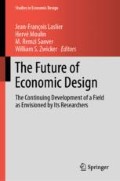Abstract
We survey several unexpected connections between computational complexity and fundamental economic questions that appear unrelated to computation.
Access this chapter
Tax calculation will be finalised at checkout
Purchases are for personal use only
References
Alaei, S., Fu, H., Haghpanah, N., Hartline, J. D., & Malekian, A. (2012). Bayesian optimal auctions via multi- to single-agent reduction. In ACM Conference on Electronic Commerce, EC ’12 (pp. 17).
Border, K. C. (1991). Implementation of reduced form auctions: A geometric approach. Econometrica, 59(4), 1175–1187.
Cai, Y., Daskalakis, C., & Matthew Weinberg, S. (2012a). An algorithmic characterization of multi-dimensional mechanisms. In Proceedings of the 44th Symposium on Theory of Computing Conference, STOC (pp. 459–478).
Cai, Y., Daskalakis, C., & Matthew Weinberg, S. (2012b). Optimal multi-dimensional mechanism design: Reducing revenue to welfare maximization. In Proceedings of the 53rd Annual Symposium on Foundations of Computer Science (FOCS) (pp. 130–139).
Che, Y.-K., Kim, J., & Mierendorff, K. (2013). Generalized reduced form auctions: A network flow approach. Econometrica, 81, 2487–2520.
Chen, X., Dai, D., Du, Y., & Teng, S.-H. (2009a) Settling the complexity of Arrow-Debreu equilibria in markets with additively separable utilities. In Proceedings of the 50th Annual IEEE Symposium on Foundations of Computer Science (FOCS) (pp. 273–282).
Chen, X., Deng, X., & Teng, S.-H. (2009b). Settling the complexity of computing two-player Nash equilibria. Journal of the ACM, 56(3), 14.
Cramton, P., Shoham, Y., & Steinberg, R. (Eds.). (2006). Combinatorial auctions. Cambridge: MIT Press.
Daskalakis, C., Goldberg, P. W., & Papadimitriou, C. H. (2009). The complexity of computing a Nash equilibrium. SIAM Journal on Computing, 39(1), 195–259.
Gopalan, P., Nisan, N., & Roughgarden, T. (2015) Public projects, Boolean functions, and the borders of Border’s theorem. In Proceedings of the 16th Annual ACM Conference on Economics and Computation (EC).
Kelso, Alexander S., & Crawford, Vincent P. (1982). Job matching, coalition formation, and gross substitutes. Econometrica, 50(6), 1483–1504.
Kushilevitz, E., Nisan, N. (1996). Communication complexity. Cambridge: Cambridge University Press.
Rothvoß, T. (2014). The matching polytope has exponential extension complexity. In Proceedings of the 46th Annual ACM Symposium on Theory of Computing (STOC) (pp. 263–272).
Roughgarden, T. (2010). Computing equilibria: A computational complexity perspective. Economic Theory, 42(1), 193–236.
Roughgarden, T. (2014). Barriers to near-optimal equilibria. In Proceedings of the 55th Annual IEEE Symposium on Foundations of Computer Science (FOCS) (pp. 71–80).
Roughgarden, T. (2015). Intrinsic robustness of the price of anarchy. Journal of the ACM, 62(5), 32.
Roughgarden. T. (2016). Communication complexity (for algorithm designers). Now Publishers.
Roughgarden, T., Talgam-Cohen, I. (2015). Why prices need algorithms. In Proceedings of the 16th Annual ACM Conference on Economics and Computation (EC).
Roughgarden, T., Syrgkanis, V., & Tardos, É. (2017). The price of anarchy in auctions. Journal of Artificial Intelligence Research, 59, 59–101.
Syrgkanis, V., Tardos, É. (2013). Composable and efficient mechanisms. In Proceedings of the 44th Annual ACM Symposium on Theory of Computing (STOC) (pp. 211–220).
Author information
Authors and Affiliations
Corresponding author
Editor information
Editors and Affiliations
Rights and permissions
Copyright information
© 2019 Springer Nature Switzerland AG
About this chapter
Cite this chapter
Roughgarden, T. (2019). Complexity-Theoretic Barriers in Economics. In: Laslier, JF., Moulin, H., Sanver, M., Zwicker, W. (eds) The Future of Economic Design. Studies in Economic Design. Springer, Cham. https://doi.org/10.1007/978-3-030-18050-8_22
Download citation
DOI: https://doi.org/10.1007/978-3-030-18050-8_22
Published:
Publisher Name: Springer, Cham
Print ISBN: 978-3-030-18049-2
Online ISBN: 978-3-030-18050-8
eBook Packages: Economics and FinanceEconomics and Finance (R0)

